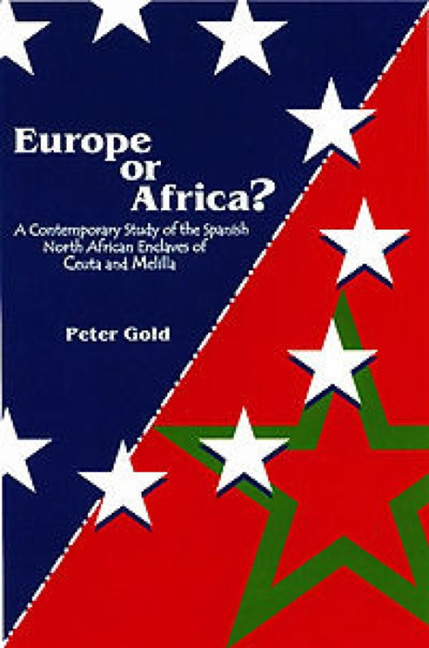Book contents
- Frontmatter
- Dedication
- Contents
- Acknowledgement
- List of figures and tables
- Map
- Introduction
- 1 The impact of the enclaves on Spanish–Moroccan relations
- 2 The enclaves within the Spanish state: the autonomy statutes
- 3 The evolving political landscape in the enclaves
- 4 The 1985 Immigration Law and community relations in the enclaves
- 5 The enclaves: a migration gateway to Europe
- 6 The enclaves: Europe or Africa?
- 7 Gibraltar and the enclaves
- 8 Conclusion: looking to the future
- References
- Index
4 - The 1985 Immigration Law and community relations in the enclaves
- Frontmatter
- Dedication
- Contents
- Acknowledgement
- List of figures and tables
- Map
- Introduction
- 1 The impact of the enclaves on Spanish–Moroccan relations
- 2 The enclaves within the Spanish state: the autonomy statutes
- 3 The evolving political landscape in the enclaves
- 4 The 1985 Immigration Law and community relations in the enclaves
- 5 The enclaves: a migration gateway to Europe
- 6 The enclaves: Europe or Africa?
- 7 Gibraltar and the enclaves
- 8 Conclusion: looking to the future
- References
- Index
Summary
By the mid-1980s there was growing concern in the enclaves on the part of the inhabitants of European origin (who called themselves españoles but were also identified by their faith as cristianos) regarding the increasing number of Moroccan residents (referred to by the cristianos as marroquíes [Moroccans] or pejoratively as moros [Moors], but described by themselves and in the press as musulmanes [Muslims]).
Table 4.1 shows (on the basis of available figures) the growth of both the total population and the Muslim population in Ceuta and Melilla. Although there are some discrepancies between official and unofficial figures (Carabaza and de Santos, 1992, p. 97), the table clearly indicates the increasing proportion of Muslims resident in the enclaves, especially in the period after 1960 when the total populations began to decline from their peak (or near peak) following Moroccan independence.
What the figures do not reveal, however, are the inequalities in terms of legal status and citizenship between the cristiano and musulmán communities. In 1987 in Ceuta there were some 15,000 Muslims (22.5 per cent of the total population), of whom 2,400 (16 per cent) had a national identity document conferring Spanish nationality (López García, 1993a, p. 58). Of the remainder, 500 possessed the ‘statistical’ identity card introduced in 1958, a minimal form of documentation which did not even provide them with unemployment benefit or allow them to travel to mainland Spain or to Morocco. But they and the other 12,000 were stateless, including a large number who were born in the enclave.
In Melilla the figures were equally stark: of the 17,800 Muslims (32.5 per cent of the total population), 6,000 (34 per cent) had the national identity document which gave them Spanish nationality, but approximately 12,000 were stateless (López García, 1993a, p. 58). Of these 6,500 held only the ‘statistical’ identity card and the remainder, including many who were born in Melilla, had no official documentation.
Although there was a higher proportion of Muslims in Melilla than in Ceuta, there were clearly fears on the part of the cristiano community about the ‘Moroccanization’ of both enclaves (some were concerned that granting citizenship to the musulmanes would result in the election of Muslim candidates to the local council – as indeed eventually happened), and there was a distinct hierarchy of citizenship which neither the authorities in the enclaves nor the Government in Madrid seemed prepared to challenge.
- Type
- Chapter
- Information
- Europe or Africa?A Contemporary Study of the Spanish North African Enclaves of Ceuta and Melilla, pp. 91 - 119Publisher: Liverpool University PressPrint publication year: 2000



